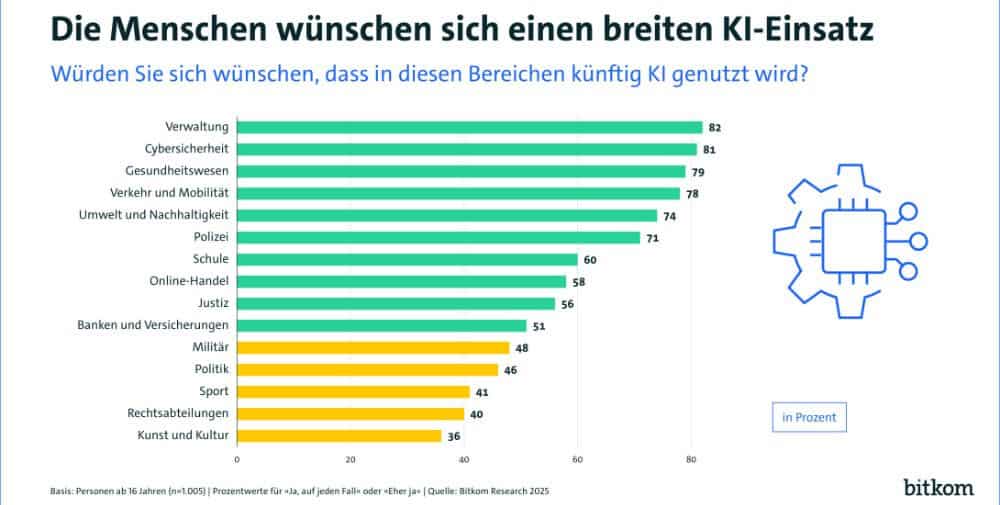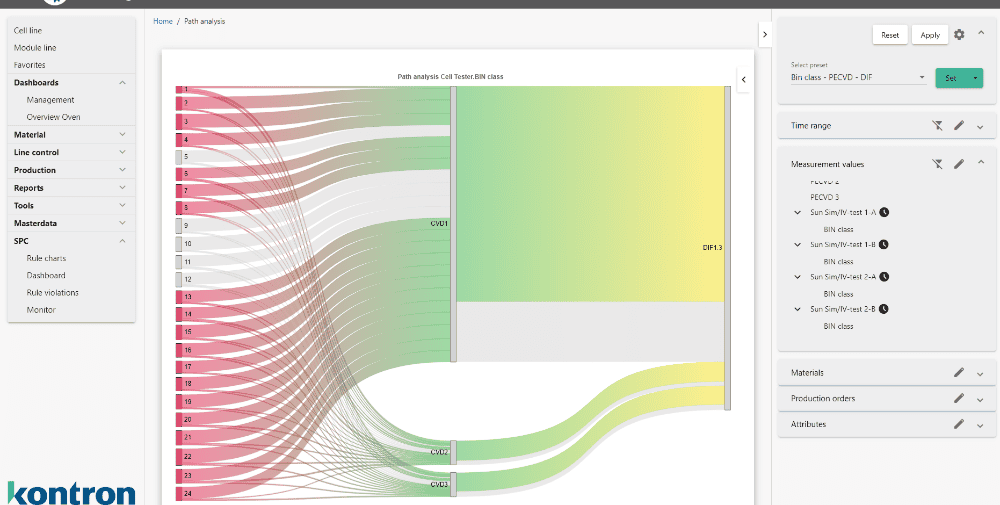
“Never before has a new technology spread as quickly as artificial intelligence. AI has taken Germany by storm and has been adopted by people across society,” says Bitkom President Dr. Ralf Wintergerst. “This makes it all the more important that we don’t slip into new digital dependencies when it comes to AI. We must now quickly create the conditions for a sovereign German and European AI industry.”
Bitkom proposes, among other things, the updating of the national AI strategy, supplemented by an AI application strategy that contains measurable goals. At least 10 billion euros from the special fund would therefore have to be made available over the next five years to promote the AI location. In addition, massive investments in high-performance national AI data centers and a German AI Gigafactory are necessary, combined with easier access for companies and start-ups. “AI is not just about technology, it is at least as much about the people who develop and use it. We need to promote and attract AI talent,” says Wintergerst. This requires a whole range of measures, from a compulsory computer science subject in schools to more English-language AI degree courses and the promotion of AI training programs for employees. And finally, Bitkom is calling for an innovation-friendly regulatory framework. “This involves new regulations such as the AI Act, but also the interpretation of the General Data Protection Regulation with regard to AI applications,” says Wintergerst. “We must not give ourselves a leg up in the global competition for AI; companies need more freedom for AI innovations.”
Two thirds consider AI to be the most important future technology
For a clear majority of 67% of German citizens, AI is the most important future technology (2024: 63%). In contrast, 28% see AI as massively overrated and hype (2024: 32%). At the same time, the opportunity perspective outweighs the threat perspective in the population: 20% see AI exclusively as an opportunity, 54% rather as an opportunity. Some 18% see AI as a threat, while only 5% see it as a threat.
If people have their way, AI should be used in a variety of areas of life. For example, 82% want AI in administration, 81% in cyber security, 79% in healthcare and 78% in transportation. This is followed by AI use for the environment and sustainability (74%), in the police (71%), in schools (60%), in online retail (58%), in the justice system (56%) and in banking and insurance (51%). In contrast, there is no majority for the use of AI in the military (48%), politics (46%), sport (41%), legal departments (40%) and art and culture (36%). “AI can already perform a wide range of tasks quickly and efficiently, especially when it comes to large volumes of text and data. In view of the demographic trend, which will lead to a decline in the working population, we really need AI everywhere: in administration, business and society,” says Wintergerst.
When it comes to AI, it’s all about trust in the provider – and the country of origin
When selecting an AI, a clear majority (62%) consider trust in the provider to be a decisive criterion, while 48% also consider the provider’s country of origin. This is followed by the quality of the results (39%), ease of use (35%) and performance, such as speed (27%). Costs play the least important role: they are decisive for only 19% when choosing a provider.
Accordingly, there is a great desire for AI offerings from Germany. Two thirds (69%) would use an AI provider from Germany, followed by France (49%), South Korea and Japan (48% and 45% respectively) and the other EU countries and the USA (41% each). 31% would use an AI provider from Israel, 30% from China and just 1% would use AI services from Russia. “Germany has the opportunity to become an AI nation. The task now is to match people’s interest with powerful German offerings,” says Wintergerst.
In practice, however, the three major US providers dominate the generative AI market. They divide the majority of the market between them. For example, 43% of people in Germany use ChatGPT, 39% Microsoft Copilot and 28% Gemini from Google. A further 43 percent are familiar with ChatGPT but do not use it, 43 percent use Gemini and 35 percent use Copilot. Other services are currently far behind. DeepSeek and Claude are only used by 2 percent each, 9 percent at least know them. 1 percent use Perplexity, 4 percent know it. And less than 1 percent use Grok; just 2 percent are familiar with the service, which belongs to Elon Musk’s company xAI. Other generative AI services are used by 1 percent.
Those who do not use AI primarily lack interest and trust. 77 each cite these two factors as the reason why they do not use generative AI. This is followed by a lack of technical knowledge (64 percent) and a lack of demand (48 percent). 32 percent do not know of any suitable applications, 16 percent do not have the time and 14 percent find AI too expensive. Among those who already use generative AI, a lack of trust is the most frequently cited reason for not using AI more often (33%). 30 percent do not know any suitable applications, 29 percent lack technical knowledge, 26 percent find AI too expensive, 22 percent lack time, 19 percent see no need for it and 10 percent simply have no interest in using it more frequently. 18 percent state that they already use AI frequently.
Majority: AI will noticeably change our society in 5 years at the latest
Around a third (32 percent) of Germans believe that artificial intelligence has already noticeably changed our society. A further 11 percent expect this to happen by next year and 24 percent in the next two to five years. A longer period of six to ten years is expected by 14%, with 16% expecting at least ten years. Only one in one hundred (1%) believe that AI will not change society in the future. “We need to use AI in Germany, but above all we also need to shape and advance AI. AI is about not throwing our values overboard, we have to anchor them in this key technology,” says Wintergerst.
AI at work: 6 out of 10 want to use artificial intelligence, 4 out of 10 reject it
Workers are divided when it comes to using AI at work. 56 percent would generally like AI to support them at work, while 43 percent reject this. AI is already taking over tasks for 17% of employees, 22% assume that this would be possible but do not yet use AI. Around a quarter (27%) do not currently see any possibilities for this, but believe that AI could take over tasks in the future. And 30 percent believe that this is not possible today or in the future. “AI has made rapid progress recently and can now, for example, create software code or CAD instructions for construction in addition to texts, images and videos. In the future, AI will play at least a supporting role in all professions,” says Wintergerst.
This is also shown by a look at the use of generative AI among the working population. 74% use generative AI for private purposes, compared to just 39% last year. For the first time, more than one in two people are also using AI at work, often without their employer’s knowledge. The proportion of employees who use AI at work with their employer’s knowledge has doubled from 22% to 45%. The number of people who use AI on the job without their employer’s knowledge has also doubled, from 5 percent to 10 percent. “Companies should make AI available to their employees – also in order to avoid shadow AI, which can cause a variety of legal and organizational problems,” says Wintergerst. “It’s not just about creating a technical AI offering, but also a binding set of rules and training.”
AI is seen more as an assistant for routine tasks in the workplace, not as an expert
When employees are asked about the benefits of AI in the workplace, traditional assistance functions currently dominate. 59% say that AI saves working time, 56% say it frees up time for more important tasks and 47% say that AI reduces errors. This is followed by the facilitation of routine tasks (41%) and cost savings (36%). 31% say AI increases their own motivation, 28% say it increases their own performance and 24% see accelerated processes. Less significant are the transfer of expert knowledge through AI (23%), the promotion of creativity (13%) and an improved quality of their own work results (12%). Only 7 percent see no benefits at all from AI in the workplace. “AI can do much more than just relieve us of simple routine tasks and save time. If you use AI, you always have an expert at your side and a sparring partner for discussing your own ideas,” says Wintergerst.
A clear picture emerges when you ask about the disadvantages of AI in the workplace. Three topics dominate here: It is unclear who the data goes to (66 percent) and who is responsible for errors (57 percent) – and there is a lack of human contact (64 percent). This is followed at a considerable distance by concerns about relying too much on AI and losing skills (29%), that it is too complicated to use (25%), that the use of AI makes their own work less valuable (24%) or even that they would lose their own job (22%). A fifth (21%) are afraid of being controlled by AI, 15% fear that their employer is spending too much money on AI and 13% feel under pressure from AI. 3 percent are worried that AI will take over the simple routine tasks that give them time to catch their breath. Only 2 percent see no disadvantages at all. Wintergerst: “People’s concerns about AI must be taken seriously. It is not only the companies that use AI tools that have a duty here, but also the AI providers. People’s trust is crucial to the success of AI.”
Those who use AI have a different view of the technology
The assessment of AI varies widely depending on whether you take the perspective of users or non-users. For example, 73 percent of those who do not use AI say that they feel left behind by AI (AI users: 40 percent), 70 percent are afraid of AI (AI users: 22 percent) and 67 percent feel overwhelmed by AI (AI users: 41 percent). 68 percent would even prefer to live in a world without AI altogether (AI users: 25 percent).
On the other hand, 70 percent of those who use AI themselves say that artificial intelligence makes their lives easier (non-users: 22 percent), 65 percent would like an AI assistant for everyday tasks (non-users: 38 percent), 64 percent say they enjoy AI (non-users: 11 percent), 58 percent think it will eliminate the need for lengthy internet searches (non-users: 24 percent) and 50 percent are convinced that AI will make them smarter (non-users: 25 percent). “We should prevent AI from dividing society and familiarize everyone with AI. People who use AI have a completely different view of this technology. Many people are absolutely thrilled after their first steps in the world of AI,” says Wintergerst.
Artificial intelligence is also an important topic at this year’s nationwide Digital Day on June 27, 2025, with a variety of events and workshops for interested parties. An overview can be found here: digitaltag.eu/fokusthema-ki#kiaktionen
– – – – – –
Further links
👉 www.bitkom.org
Graphic: Bitkom




